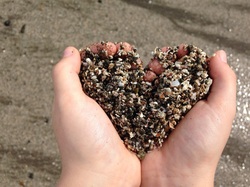Just keep holding on.
That's it. This article could end here and most gifted people I know would nod their heads and agree.
It sounds simple, but in order to keep a relationship with a gifted person, you must be willing to hold on in a way that some people are not strong enough to do. This means putting aside your own ego. It means being flexible and ready for adventures. And it means having a sense of humor even through the hardest of times.
Holding on to a gifted person that you love means holding on with a bungee cord.
They will pull, and challenge every boundary. They will sometimes fight against being held, and some days when they seem somewhat content, they are still like lions pacing their cage. They will find so many ways to push all your buttons and challenge all of your beliefs. And sometimes they will need to fly away in order to be happy when they come back. So you have to let your love pull and twist and stretch across the chasms. And then pull them back again and again, rebounding back to love each other briefly and replenish their hearts before they are off again on a new adventure.
But as anyone who loves a gifted person knows, they can be so amazing at times that the great times are still worth all of the hardest parts. They love fiercely and are passionate about wonderful things that others may not even notice. They keep you entertained and challenged to the edge of what you think you are capable of. Then they will fight to the death for you, risk their lives for causes that matter to you both (and to the world), and then they will hold you so close you think your souls are one. Riding along on the emotional roller coaster with a loved one who is gifted is dizzying and may make your head spin, but your heart will almost burst from the highs. Hang on tightly- There's often no other choice!
Gifted people are constantly searching for their tribe, to the point of sometimes looking right through their best and closest support system as if they don't even notice you are there. Gifted people are seekers – they are not easily satisfied and will challenge those that care about them to "step it up" even another notch, and prove their love and commitment over and over again in little ways, as well as some big ones that might take your breath away. They will demand excellence and teach you to fly with them if you show you won't just fall. And if you hold on tight, you are worth more than anything they could ever find in their searches. Gifted people often are searching for other gifted people who are also searching for something, which means they are often lonely and even when they find someone or something they still end up left alone a lot. Gifted tribe mates are often on to the next challenge too, so when they finally think they've caught each other and life will be great, one of them decides they need something more novel and they are off again. Even when gifted people seem content, they are only in a temporary holding pattern. Gifted people do not always know how to hold on, so you have to hold on for both of you.
If you are the friend or loved one of a gifted person, and you are gifted yourself, you may have to hold on even harder! You will see the same traits in each other at times, which are the same traits that make you hard to live with. But you may forge a bond that others will never understand, and sometimes you will not understand it either.
If you are not gifted, or you at least don't think you are, then you may be the calming and stoic partner that a gifted person needs to keep them grounded and feeling safe and loved. However, there will be times you will not understand each other and in order to get through those moments, you must both find grace in each other's attempts at problem-solving. That is when holding on becomes an act of love itself.
There is something to be said for surviving a hurricane or tornado. You may feel at times like you are trying to hang on to some kind of foundation while branches and cars are being tossed in your direction... gifted people know how to throw everything in the path of love, because they may not feel they deserve happiness or because they have had so many relationship challenges and let downs in the past that they don't even trust it. Or perhaps they just have so much going on in their busy and sometimes even chaotic lives that they don't realize the way others may interpret their behaviors negatively. And other times they may run away from anything that seems boring or stable, and reaching them is like grabbing at the wind in a storm. But relationships that make it through hardships are more solid than those that seem too easy. When people know each others' weaknesses and faults and still love each other fiercely, there's less that can surprise them and shake things up.
So how do you best love a gifted person? Like fire that burns swiftly and passionately when stoked, and then lays waiting and smoldering in embers when the wind blows too hard. Like the waves of the sea that ebb and flow with the tides. And like the sun that comes up again every single day. Loving a gifted person takes every element of your being sometimes. But if you think it is worth it, then the best game plan is just keep holding on.
THIS ARTICLE IS A PART OF THE HOAGIES' GIFTED EDUCATION BLOG HOP FOR SEPTEMBER 2016.
YOU CAN FIND MORE HOAGIES' BLOG HOP ENTRIES AT http://www.hoagiesgifted.org/blog_hop_community.htm






 RSS Feed
RSS Feed
